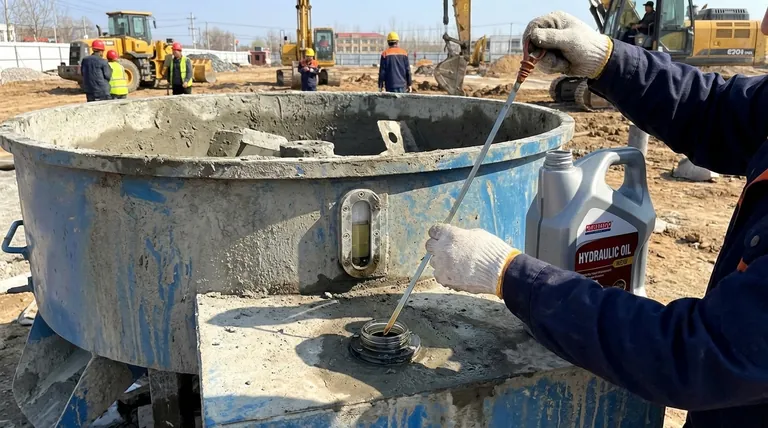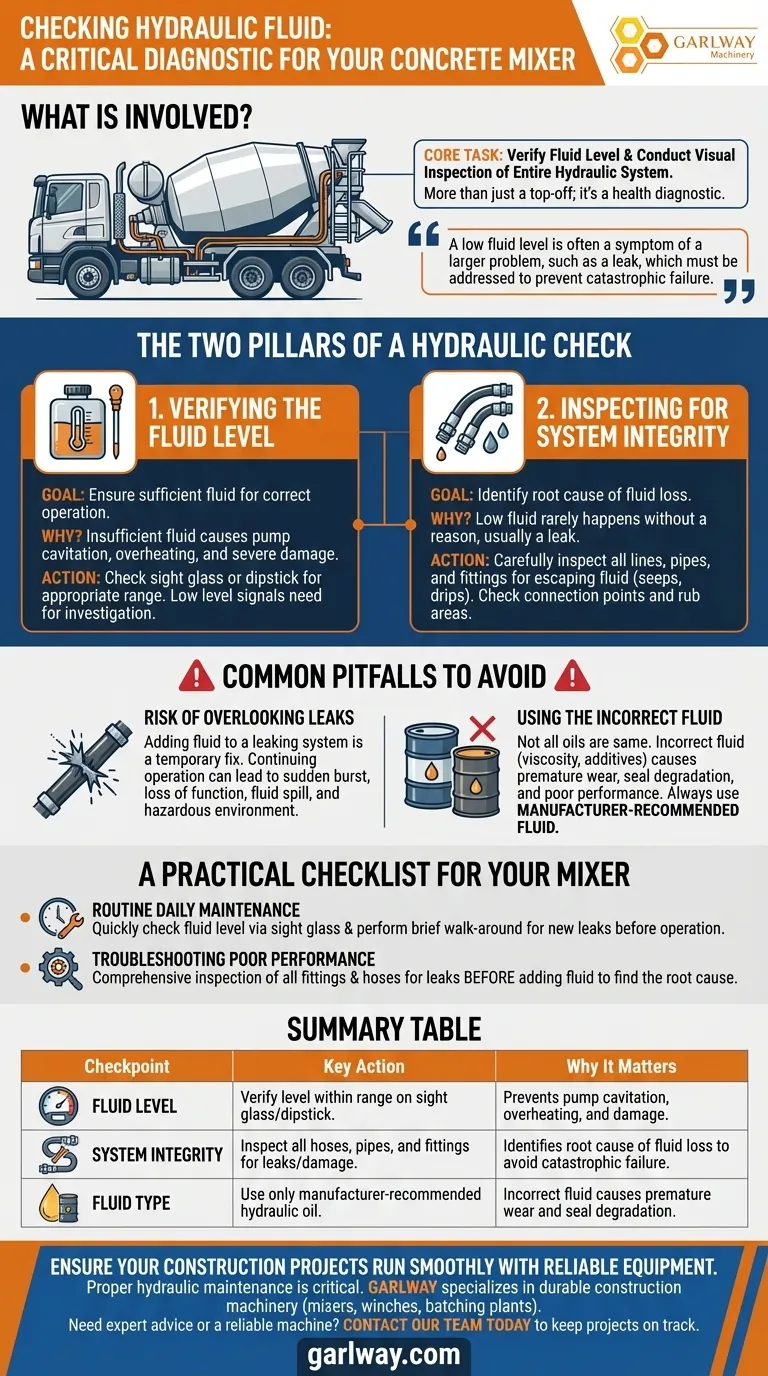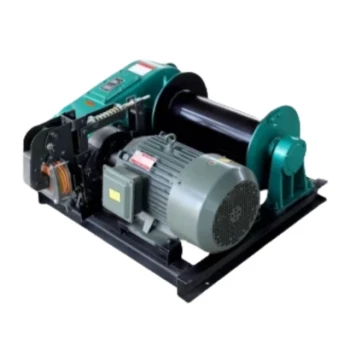To properly check the hydraulic fluid of a concrete mixer, you must perform two key actions: verify the fluid is at the correct level within its reservoir and conduct a visual inspection of the entire hydraulic system for any leaks, loose fittings, or damaged hoses. Simply adding fluid without checking for the cause of the loss can lead to system failure.
The core task is not just about fluid levels; it's a critical diagnostic of the hydraulic system's health. A low fluid level is often a symptom of a larger problem, such as a leak, which must be addressed to prevent catastrophic failure.

The Two Pillars of a Hydraulic Check
A thorough hydraulic fluid check is a fundamental part of preventative maintenance. It breaks down into two equally important components: assessing the fluid itself and inspecting the integrity of the system that contains it.
Verifying the Fluid Level
The most direct step is ensuring there is enough fluid for the system to operate correctly. Insufficient fluid can cause the pump to cavitate (draw in air), leading to overheating and severe damage.
You must ensure the fluid level is within the appropriate range indicated on the sight glass or dipstick. If the level is low, it's a clear signal that further investigation is required.
Inspecting for System Integrity
A low fluid level rarely happens without a reason. The most common cause is a leak somewhere in the system.
Carefully inspect all hydraulic lines, pipes, and fittings. Look for signs of escaping fluid, from slow seeps to active drips. Pay close attention to connection points and areas where hoses might rub against the mixer's frame.
Common Pitfalls to Avoid
Treating a hydraulic check as a simple "top-off" task is a significant mistake. Understanding the potential pitfalls ensures the long-term reliability and safety of your equipment.
The Risk of Overlooking Leaks
Simply adding fluid to a leaking system is a temporary fix that masks a critical failure point.
Continuing to operate a mixer with a small leak can lead to a sudden hose burst under pressure, causing a loss of hydraulic function, a significant fluid spill, and a hazardous work environment.
Using the Incorrect Fluid
Not all hydraulic oils are the same. Using a fluid that does not meet the manufacturer's specifications can be just as damaging as running the system dry.
Always add a suitable hydraulic oil as recommended for your specific mixer model. Incorrect viscosity or additive packages can lead to premature wear, seal degradation, and poor performance.
A Practical Checklist for Your Mixer
Use these points to guide your actions based on your immediate goal.
- If your primary focus is routine daily maintenance: Quickly check the fluid level via the sight glass and perform a brief walk-around to spot any obvious new leaks before operation.
- If your primary focus is troubleshooting poor performance or a known issue: Conduct a comprehensive inspection of all fittings and hoses for leaks before adding any fluid to determine the root cause of the fluid loss.
Properly maintaining your hydraulic system is fundamental to ensuring your concrete mixer operates safely and reliably.
Summary Table:
| Checkpoint | Key Action | Why It Matters |
|---|---|---|
| Fluid Level | Verify level is within range on sight glass/dipstick. | Prevents pump cavitation, overheating, and damage. |
| System Integrity | Inspect all hoses, pipes, and fittings for leaks or damage. | Identifies the root cause of fluid loss to avoid catastrophic failure. |
| Fluid Type | Use only manufacturer-recommended hydraulic oil. | Incorrect fluid causes premature wear and seal degradation. |
Ensure your construction projects run smoothly with reliable equipment. Proper hydraulic system maintenance is critical for the safety and efficiency of your concrete mixers. GARLWAY specializes in providing durable construction machinery, including robust concrete mixers, winches, and batching plants, designed for the demanding needs of construction companies and contractors globally. Our equipment is built to minimize downtime and maximize productivity. Need expert advice or a reliable machine? Contact our team today to discuss your requirements and keep your projects on track.
Visual Guide

Related Products
- Ready Mixer Machine for Construction Ready Mix Machinery
- Commercial Construction Mixer Machine for Soil Cement Mixing Concrete
- Auto Concrete Cement Mixer Machine New
- JDC350 Small Cement Concrete Mortar Mixer
- HZS90 Large Multiquip Concrete Mixers for Construction
People Also Ask
- How does the drum design affect a concrete mixer truck's performance? Optimize Your Mix Quality & Efficiency
- Where are Continuous Mixers generally set up? On-Site Setup for Maximum Efficiency and Fresh Concrete
- How are self-loading concrete mixers used in foundation and ground consolidation? Ensure Strong, Monolithic Foundations
- What is the Quad-Mixing System in cement mixers? Achieve Superior Concrete Quality & Efficiency
- What makes horizontal shaft mixers suitable for certain types of aggregates? Superior Mixing for Heavy & Dry Materials
- What are the main reasons for the popularity of self loading mixer trucks? Unlock On-Site Concrete Control
- What are the main differences in mixing technology between planetary and drum mixers? Choose the Right Mixer for Your Project
- How does volumetric concrete compare to ready-mix concrete? Choose the Right Method for Your Project


















